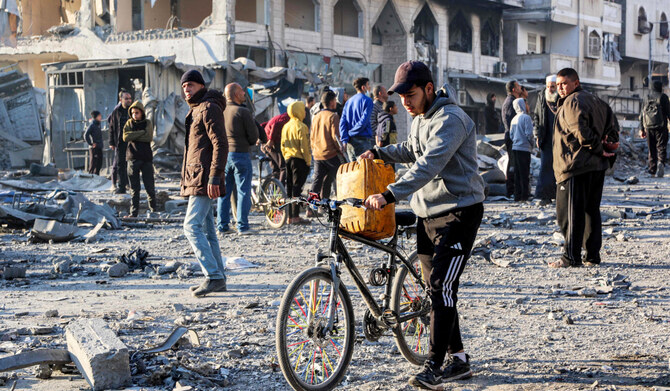AMMAN: At least 105 Palestinians were injured in East Jerusalem on Thursday night as they confronted around 300 far-right Jewish extremists who had marched towards the Old City chanting “Death to Arabs” and reportedly threatening to burn the city. Twenty-two of the injured were hospitalized.
Police made an effort to keep the groups apart, but used stun grenades, tear gas and water cannons only against Palestinian protesters. There were no reports of any of the Israeli ultra-nationalists being detained.
Fadi Hidmi, Palestinian minister of Jerusalem affairs, denounced the Jewish extremists’ attacks and called for international protection for Jerusalemites.
“The intention of the extremists was known beforehand, yet the Israeli police failed to provide the most basic of protection to the Palestinian people of East Jerusalem,” Hidmi said.
Prime Minister Mohammad Shtayyeh called the anti-Palestinian violence in Jerusalem “state terror.”
Prof. Sari Nusseibeh, former president of Al-Quds University and the number-two candidate on the Mustaqbal (future) election list, told Arab News that the issue of Jerusalem is a struggle over land between two peoples and is central to the national cause.
“The Ramallah authority committed a major error by not placing Jerusalem at the top of its political and financial agenda. As the capital of occupied Palestine, Jerusalem should be given priority on all Arab, Muslim and international platforms,” he said.
Fleur Hassan-Nahoum, Israeli deputy mayor of Jerusalem, told Arab News that she believes the violence started due to a TikTok video showing Arab men assaulting an ultra-orthodox man.
She praised other Arabs for defending the man, but said the video “caused an escalation that has brought Jewish and Arab extremists to riots.”
Hassan-Nahoum called the Jewish group, Lahava, “a bunch of extremists” who were making it difficult for police to quell the rioting and insisted that rioters on both sides are treated equally by the Israeli police. She urged community leaders on both sides to appeal to young people to stay home.
Regarding the extremists’ calls for the murder of Arabs and arson, she said: “All Jews have come out against the racist statements.”
Hassan-Nahoum was unable to confirm whether Prime Minister Benjamin Netanyahu or any other Israeli political or religious leaders would issue a statement denouncing the death threats against Arabs.
Jordanian Foreign Ministry spokesman Daifallah Al-Fayez issued a statement denouncing the “incitement and provocations” of extremist Jewish groups and held the Israeli government responsible for “allowing the extremists to get to the Old City and attack Jerusalemites.”
The US Embassy in Israel issued a statement expressing concern about the violence in Jerusalem. “We hope all responsible voices will promote an end to incitement, a return to calm, and respect for the safety and dignity of everyone in Jerusalem,” the statement said.
Ir Amim, an Israeli human-rights organization, blamed the Israeli police for their decision to bar Palestinians from using the staircase at the entrance of Damascus gate during evening hours in Ramadan.
“The incidents of friction and confrontation in the area stem from the closure of the Damascus Gate steps and unprovoked police aggression and use of excessive force toward Palestinians, which disrupt the peace and lead to escalation,” it said.
Multiple videos were posted on social media including one showing Jewish youths attacking an Arab home just inside the Old City. Children’s cries can be heard as an unseen woman shouts “Stop” in Arabic, while several Jewish youths throw objects at the home.
Orthodox priest Atallah Hanna, archbishop of Sabastia, told Arab News that the incitement by Jewish extremists against Jerusalemites is part of a racist policy intended to force Palestinians from the city.
“They want the people of the Old City to live in terror — especially at a time when Christians are fasting for lent and Muslims are fasting in Ramadan — but these terrorizing actions will not deter us,” he said.
IfNotNow, a movement of Israelis calling “to end Israel’s occupation and to transform the American Jewish community,” issued a blistering statement calling what happened in Jerusalem a “pogrom” and blaming Israeli leaders for inciting the violence.
“Make no mistake: The anti-Arab riots in Jerusalem are the result of decades of incitement from Israeli leaders who have more and more power,” the statement said.




























